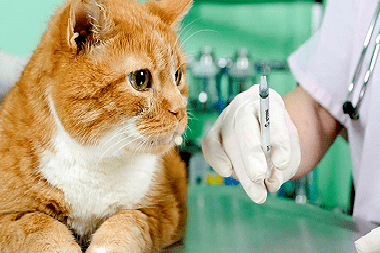Diseases of pets >>>> Important vaccinations for animals
Important vaccinations for animals.

There are a number of diseases that require prevention, as they can become fatal to the animal. In order to preserve the health and life of your pet and protect yourself from troubles and disorders, it is necessary to vaccinate pets: those that are used to walking on the street and those that do not walk outside the premises. Vaccinations are done so that the animal's immune system develops antibodies to certain viruses and bacteria in advance and, during the period of subsequent infection, meets the attack of harmful organisms in all weapons.
Vaccinations of animals are carried out at the age when the animal is still a calf (at 2-5 months). If the animal for some reason was not vaccinated, then vaccination is carried out regardless of the age of the pet and without waiting for an epidemic of the disease.
The most important vaccinations for cats and dogs are rabies (cats and dogs), panleukopenia (cats), connective tissue sarcoma (cats), tick-borne encephalitis (dogs and cats), tick-borne piroplasmosis (dogs), viral hepatitis (dogs), from viral enteritis (dogs), from lichen (cats and dogs), from distemper (cats and dogs), from leptospirosis (cats and dogs).
Why vaccination of an animal avoids the disease, and the disease itself can cause death of the animal. The vaccine includes either weakened viruses in a laboratory way, or their specific toxins that have undergone partial inactivation. In this case, the dose of the vaccine received by the animal will not cause the full height of the disease, but will activate the work of the immune system for the future. With a weakened microorganism or its inactivated toxin, the animal's body will be able to cope on its own. And a trained pet organism, armed with antigens to dangerous microbes, will be able to resist highly virulent pathogenic microorganisms.

Read

Read



























